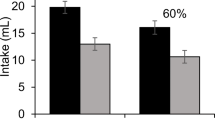Abstract
Background
Soda manufacturers claim that caffeine is added to soda as a flavor enhancer, but many researchers have speculated that caffeine is added to increase the hedonic and reinforcing properties of the soda. Studies in adults have demonstrated that caffeine can condition flavor preferences when added to novel-flavored beverages.
Objectives
The purpose of this study was to test the hypothesis that caffeine added to novel-flavored drinks would increase liking and preference in adolescents.
Methods
Adolescents (n = 99) between the ages of 12 and 17 rated and ranked seven novel soda drinks. They were then randomly assigned to consume one of these beverages paired with either caffeine (1 or 2 mg/kg) or placebo over four consecutive days and rate liking. On the final visit, participants retasted the seven beverages and provided hedonic ratings and rankings.
Results
Participants in the 2-mg/kg caffeine group increased the liking of the beverage over the exposure period after an initial decrease, but there was no change in liking for those in the placebo group or in the 1-mg/kg group. The increase in liking in the 2-mg/kg group was accompanied by a decrease in perceived bitterness, but no change in beverage ranking or consumption during the post-test.
Conclusions
Caffeine added to novel beverages results in a decrease in liking followed by an increase in liking with repeated exposures that may result from habituation to the bitterness of caffeine. Change in bitter perception may be the mechanism by which adolescents establish regular caffeine use.



Similar content being viewed by others
References
Anzman-Frasca S, Savage JS, Marini ME, Fisher JO, Birch LL (2012) Repeated exposure and associative conditioning promote preschool children's liking of vegetables. Appetite 58:543–553
Beverage DC (1999) Beverage digest fact book 1999. NY Beverage Digest Co., Bedford Hills
Frary CD, Johnson RK, Wang MQ (2005) Food sources and intakes of caffeine in the diets of persons in the United States. J Am Diet Assoc 105(1):110–113
Greden JF, Procter A, Victor B (1981) Caffeinism associated with greater use of other psychotropic agents. Compr Psychiatry 22(6):565–571
Griffiths RR, Vernotica EM (2000) Is caffeine a flavoring agent in cola soft drinks? Arch Fam Med 9(8):727–734
Griffiths RR, Woodson PP (1988) Reinforcing effects of caffeine in humans. J Pharmacol Exp Ther 246(1):21–29
Griffiths RR, Evans SM, Heishman SJ, Preston KL, Sannerud CA, Wolf B, Woodson PP (1990) Low-dose caffeine discrimination in humans. J Pharmacol Exp Ther 252(3):970–978
Kaminer Y (2010) Problematic use of energy drinks by adolescents. Child Adolesc Psychiatr Clin N Am 19(3):643–650
Lakkakula A, Geaghan J, Zanovec M, Pierce S, Tuuri G (2010) Repeated taste exposure increases liking for vegetables by low-income elementary school children. Appetite 55(2):226–231
McCutcheon B, Tennissen AM (1989) Acid and NaCl self-adaptation with micro-drop stimulation of fungiform papillae. Physiol Behav 46(4):613–618
Mela DJ (1989) Caffeine ingested under natural conditions does not alter taste intensity. Pharmacol Biochem Behav 34(3):483–485
Mela DJ, Mattes RD, Tanimura S, Garcia-Medina MR (1992) Relationships between ingestion and gustatory perception of caffeine. Pharmacol Biochem Behav 43(2):513–521
Miller KE (2008) Wired: energy drinks, jock identity, masculine norms, and risk taking. J Am Coll Health 56(5):481–489
O'Mahony M (1979) Salt taste adaptation: the psychophysical effects of adapting solutions and residual stimuli from prior tastings on the taste of sodium chloride. Perception 8(4):441–476
Pennington N, Johnson M, Delaney E, Blankenship MB (2010) Energy drinks: a new health hazard for adolescents. J Sch Nurs 26(5):352–359
Richardson NJ, Rogers PJ, Elliman NA, O'Dell RJ (1995) Mood and performance effects of caffeine in relation to acute and chronic caffeine deprivation. Pharmacol Biochem Behav 52(2):313–320
Richardson NJ, Rogers PJ, Elliman NA (1996) Conditioned flavour preferences reinforced by caffeine consumed after lunch. Physiol Behav 60(1):257–263
Temple JL, Ziegler AM (2011) Gender differences in subjective and physiological responses to caffeine and the role of steroid hormones. J Caffeine Res 1(1):41–48
Temple JL, Bulkley AM, Briatico L, Dewey AM (2009) Sex differences in reinforcing value of caffeinated beverages in adolescents. Behav Pharmacol 20(8):731–741
Temple JL, Dewey AM, Briatico LN (2010) Effects of acute caffeine administration on adolescents. Exp Clin Psychopharmacol 18(6):510–520
Tinley EM, Durlach PJ, Yeomans MR (2004) How habitual caffeine consumption and dose influence flavour preference conditioning with caffeine. Physiol Behav 82(2–3):317–324
Wardle J, Cooke LJ, Gibson EL, Sapochnik M, Sheiham A, Lawson M (2003) Increasing children's acceptance of vegetables; a randomized trial of parent-led exposure. Appetite 40(2):155–162
Yeomans MR, Spetch H, Rogers PJ (1998) Conditioned flavour preference negatively reinforced by caffeine in human volunteers. Psychopharmacology (Berl) 137(4):401–409
Yeomans MR, Jackson A, Lee MD, Nesic J, Durlach PJ (2000a) Expression of flavour preferences conditioned by caffeine is dependent on caffeine deprivation state. Psychopharmacology (Berl) 150(2):208–215
Yeomans MR, Jackson A, Lee MD, Steer B, Tinley E, Durlach P, Rogers PJ (2000b) Acquisition and extinction of flavour preferences conditioned by caffeine in humans. Appetite 35(2):131–141
Yeomans MR, Pryke R, Durlach PJ (2002) Effect of caffeine-deprivation on liking for a non-caffeinated drink. Appetite 39(1):35–42
Yeomans MR, Durlach PJ, Tinley EM (2005) Flavour liking and preference conditioned by caffeine in humans. Q J Exp Psychol B 58(1):47–58
Acknowledgments
AMZ and JLT were involved in the development of the research plan, study oversight, and writing; AG, AB, SO, and YS were all involved in the data collection, data entry, and quality control, and JLT has primary responsibility for the final content. All authors have read and approved the final manuscript. The authors thank Leah Scarborough for preparation of the caffeine and placebo. None of the authors have conflicts of interest to report.
Funding
This study was supported by funding from NIDA to JLT (KO1 DA021759-01). None of the authors have any conflicts of interest to report.
Author information
Authors and Affiliations
Corresponding author
Rights and permissions
About this article
Cite this article
Temple, J.L., Ziegler, A.M., Graczyk, A. et al. Influence of caffeine on the liking of novel-flavored soda in adolescents. Psychopharmacology 223, 37–45 (2012). https://doi.org/10.1007/s00213-012-2684-2
Received:
Accepted:
Published:
Issue Date:
DOI: https://doi.org/10.1007/s00213-012-2684-2




